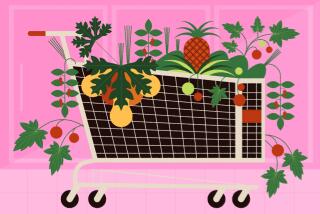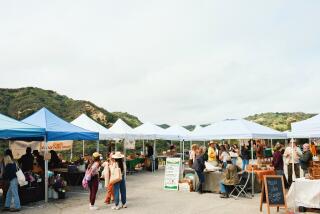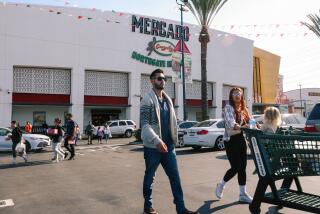Alex Weiser of Weiser Family Farms has deep local roots
The gig: Alex Weiser, 49, of Weiser Family Farms grows some of the Southland’s most sought-after fruits and vegetables on three farms in Kern and San Bernardino counties. Weiser potatoes can be found on the vaunted Providence restaurant menu in Hollywood. His melons are picked ripe and sold at Whole Foods Markets. You can find him every Wednesday and Saturday at the Santa Monica Farmers Market.
Family business: Weiser is co-owner of a family operation started by his father, Sid Weiser. At 88, his father lives in Claremont and still works part time at the farms. Alex Weiser pitched in as a teenager when the family bought its first farm in Tehachapi in 1977, and he has worked there ever since. He’s now the public face of the business, attending farmers markets and keeping in touch with the region’s top chefs.
His sister, Esther Maso, 57, is a former elementary school teacher who handles sales and human resources. Brother Daniel Weiser, 55, spent years at the Disney Channel’s marketing department and now handles farming, marketing and crunches numbers in the office.
Growing a business as well as crops: Since Sid Weiser started the business it has grown and prospered. The family now has operations in Tehachapi, Lucerne Valley and Lamont, southeast of Bakersfield, and it has become a Southern California leader in producing specialty crops of fruits and vegetables. Alex Weiser said sales volume has tripled the last 10 years and the family has plans to double its production.
Game changer: In 1981, Vance Corum — a pioneer in establishing urban farmers markets — knocked on the front door of the Weisers’ double-wide trailer home in Tehachapi and pitched the idea of selling produce to underserved neighborhoods in Southern California.
At the time, family farms were closing rapidly, wilting against larger competition and strict distribution rules. When Gov. Jerry Brown signed an executive order in 1977 allowing growers to sell directly to consumers at farmers markets, a new business model was born.
“That was a watershed moment,” Weiser said of joining the farmers market movement. “Prior to that, there was always a disconnect between farmer and consumer. We wouldn’t have survived otherwise.”
Beholden to the weather: In the late 1970s, the business looked like it was in ruin after three consecutive spring frosts in Tehachapi destroyed the family’s apple harvests. “We had put so much money into pruning and irrigation,” Weiser said. “We learned the hard way the reality of agriculture, that you can lose it all to Mother Nature.”
Spud stardom: The Weisers planted potatoes after the apple disaster. The tubers were much easier to grow and more forgiving of volatile weather. Chefs started seeking out the family’s specialty potatoes such as the Russian Banana fingerlings and the Red Thumb potatoes. Today about half the farm’s sales come from Weiser spuds.
“We discovered people didn’t want the typical russet and white potatoes at the grocery store,” Weiser said. “We came across thousands of different potato varieties, so we asked, ‘Why compete with the big boys on volume when we can grow for quality and flavor?’ ”
Crop rotation: Running a successful specialty farm means keeping up with the trends and planting crops to meet new demands. Chefs are always looking for something other restaurants don’t have.
Weiser says he stays in touch with consumers and customers. The Santa Monica Farmers Market, for instance, has become a forum where farmers and cooks can exchange ideas, he said. It’s also where Weiser can test out new items before committing too much acreage on his farms. He’s currently testing oddities such as black salsify, a root vegetable that tastes like oyster; spigarello, an Italian kale; and a creamy purple and gold potato known as a Laker Baker.
Time to experiment: A willingness to experiment comes from being relatively new to the business, Weiser said. It has also been a defining feature.
“When we bought the farm, we had so much enthusiasm and we were more apt to discover new things,” he said. “We weren’t set in our ways. That we survived and created a self-sustaining farm has been the most rewarding thing.”







